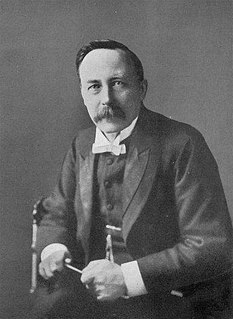A Quote by Thomas Aquinas
The theologian considers sin mainly as an offence against God; the moral philosopher as contrary to reasonableness.
Quote Topics
Related Quotes
God has decided the rules of life, whereby you don't trespass on anybody else's rights, and sin is something that upsets the balance of things. There are three types of sin: sin against yourself; sin against other people; and sin against God. People often sin against themselves and others and misbehave with God, too.
We are told that Sin consists in acting contrary to God's commands, but we are also told that God is omnipotent. . . . This leads to frightful results. . . . The British State considers it the duty of an Englishman to kill people who are not English whenever a collection of elderly gentlemen in Westminster tells him to do so. . . . Church and State are placable enemies of both intelligence and virtue.
The magnitude of the punishment matches the magnitude of the sin. Now a sin that is against God is infinite; the higher the person against whom it is committed, the graver the sin-it is more criminal to strike a head of state than a private citizen-and God is of infinite greatness. Therefore an infinite punishment is deserved for a sin committed against Him.
This is God's standards [against same-sex marriage and abortions]. And just because public opinion may have changed or somebody takes a poll - this is just one of the issues. And it doesn't matter what people say or what people think. It doesn't matter about the opinion polls. It's what God says, and God says this is a sin. And it's a sin against him, and he's going to judge sin.
There is no evidence for a god, no coherent definition of a god, no good argument for a god, good positive arguments against a god, no agreement among believers about the nature or moral principles of a god, and no need for a god. We can live happy, moral, productive lives without such belief, and we can do it better.
What is sin? It is the glory of God not honored. The holiness of God not reverenced. The greatness of God not admired. The power of God not praised. The truth of God not sought. The wisdom of God not esteemed. The beauty of God not treasured. The goodness of God not savored. The faithfulness of God not trusted. The commandments of God not obeyed. The justice of God not respected. The wrath of God not feared. The grace of God not cherished. The presence of God not prized. The person of God not loved. That is sin.
Given the sin of impiety through which they [the Romans] sinned against the divine nature [by idolatry], the punishment that led them to sin against their own nature followed.... I say, therefore, that since they changed into lies [by idolatry] the truth about God, He brought them to ignominious passions, that is, to sins against nature; not that God led them to evil, but only that he abandoned them to evil.
Wrath, unlike love, is not one of the intrinsic perfections of God. Rather, it is a function of God's holiness against sin. Where there is no sin, there is no wrath-but there will always be love in God. Where God in His holiness confronts His image-bearers in their rebellion, there must be wrath, or God is not the jealous God He claims to be, and His holiness is impugned. The price of diluting God's wrath is diminishing God's holiness.
































